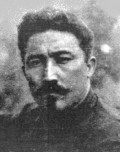| As Nedirbaj Ajtakov wrote himself in his autobiography published in a Soviet politicians guide in 1927, he "was born in the steppe of the Mangishlak region." The advance of the Soviet troops through the territory inhabited by the Turkmen and occupation of Krasnovodsk in February 1920 brought Ajtakov in local administration as chairman of a village council and then as a member of the regional revolutionary committee. In 1921 he participated in the regional congress of Soviets and in August was elected a member and then chairman of the regional executive committee. Next year he joined the Russian Communist Party of Bolsheviks, but his he never was promoted to the party Central Committee. The session of the Turkestan Central Executive Committee elected Ajtakov its deputy chairman (1923-24) and a member of the Presidium. On 9 Jan 1924, he was elected chairman of this highest executive body of Turkestan, which was part of the Russian Socialist Federative Soviet Republic at that time. During the transitional period (Nov 1924 - May 1925), Ajtakov chaired the revolutionary committee (provisional government) of the Turkmen Soviet Socialist Republic. When the government of this new constituent republic of the Soviet Union was finally formed, Ajtakov was approved in the office of the chairman (May 1925 - 1937) of the Central Executive Committee of the Turkmen SSR. With accession of Turkmenistan to the Soviet Union, Nedirbay Ajtakov was elected one of the chairmen of the USSR Central Executive Committee (21 May 1925). He served both as nominal head of state of the Soviet Union and Turkmen SSR until he was arrested in Ashkhabad on 22 Jul 1937. Ajtakov was tried and sentenced to death on 28 Oct 1938, by the military board of the USSR Supreme Court for alleged espionage and participation in a conspiracy aimed at separation of Turkmenistan from the USSR. Biography source: [2, p. 190] |

